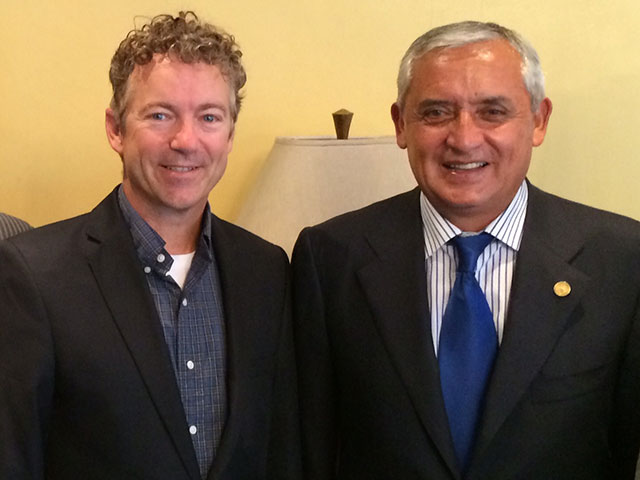GUATEMALA CITY, Guatemala — Guatemalan President Otto Perez Molina agreed to review his country’s strict policies that have prevented Americans from adopting impoverished children from here in a Wednesday meeting with Sen. Rand Paul (R-KY), Paul told Breitbart News.
“For years, there would be tens of thousands of kids who would be adopted each year in our country and it’s dwindled almost to nothing,” Paul said, recalling his message to Molina. If the recent adoption policy were reversed, “maybe that would take pressure off of some of the people, particularly unattended minors, from coming [illegally],” he added.
According to a November 2013 article from the Christian Post’s Napp Nazworth, the Guatemalan government has made it very difficult in recent years for American families to adopt orphans from their country. In January 2008, Nazworth wrote, Guatemala began the implementation of an adoption restriction law called the “Ortega law.”
“Guatemala passed the law at the insistence of the U.S. State Department to comply with the United Nations’ Hague Convention on Intercountry Adoption,” Nazworth wrote. “After the Ortega law was passed, Guatemala shut down all intercountry adoptions (even though the allegations of fraudulent adoptions have never been proven true), thus making the law a tragedy for many of the same children it was supposedly drafted to protect.”
The U.S. embassy to Guatemala notes on its website that the U.S. and Guatemala are not allowing intercountry adoption between them. “Neither Guatemala nor the United States is approving or processing new international adoptions to the United States at this time,” the U.S. embassy website reads. “The only adoptions that the Embassy is currently processing are those adoption requests that were filed before December 31, 2007 and left unfinished when Guatemala joined the Hague Convention.”
The reason why, according to the U.S. State Department’s website on adoptions is the State Department “has determined that Guatemala has not yet fully implemented legislation that would create a Convention-compliant adoption process” to complete the Hague Adoption Convention standards. “The only intercountry adoption cases that USCIS and the U.S. Embassy in Guatemala are currently processing are cases that were filed before December 31, 2007, and were not completed when Guatemala joined the Convention and implemented its new adoption code,” the State Department website reads.
Paul relayed to Molina that if Guatemala fixes the issues of the Hague Adoption Convention’s inconsistency with Guatemalan law, it could pave the way for willing U.S. families to adopt Guatemalan children. The effect could be reduced pressure for children to travel hundreds of miles illegally to the U.S., in many cases dying en route.
Paul said adoption policy changes in Guatemala are hardly the main cause of the border crisis and that the root issue is President Obama’s immigration policy.
But Paul does think that if U.S. families want to adopt a child from Guatemala, the United Nations and various international law inconsistencies shouldn’t stand in the way. “Much of what we’re talking about is kids at the border, we’re talking about 90,000 kids–many of them unattended minors–basically many unattended minors are kids who could be eligible for adoption,” Paul said. “Really, literally, there were thousands of kids being adopted from Guatemala until 2008, 2009, and then it’s dwindled. They’ve cleared some of the backlog, and they said it used to be maybe too easy and now it’s way too hard but there could be a legal way to try to improve immigration this way. I’m hopeful and we’re to keep up with him through our ambassador. But it’s once again just a good way to improve relations between our countries, but with regards to immigration, once again, I let him know I don’t think the source of the problem is in Guatemala. It’s in our White House.”
Molina said “said he would talk to his Congress about” the issue in their 45-minute meeting, Paul said.

COMMENTS
Please let us know if you're having issues with commenting.